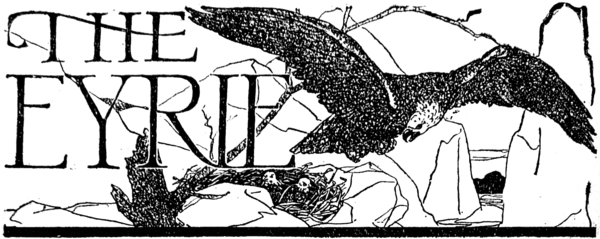
The tragic death of Robert E. Howard has called forth a chorus of praise from discerning critics who have appreciated the genuine literary value of his work. H. P. Lovecraft, one of the acknowledged masters of weird fiction, whose keenly analytical mind has started many young writers on literary careers, makes the following comment on Howard's work: "Howard's death forms weird fiction's worst blow since the passing of good old Canevin [Henry S. Whitehead] in 1932. Scarcely anybody else in the pulp field had quite the driving zest and spontaneity of Robert E. Howard. He put himself into everything he wrote—and even when he made outward concessions to pulp standards he had a wholly unique inner force and sincerity which broke through the surface and placed the stamp of his personality on the ultimate product. How he could surround primal megalithic cities with an aura of seon-old fear and necromancy! And his recent Black Canaan (WT's best story in the last three or so issues) is likewise magnificent in a more realistic way—reflecting a genuine regional background and giving a clutchingly powerful picture of the horror that stalks through the moss-hung, shadowcursed, serpent-ridden swamps of the farther South. Others' efforts seem pallid by contrast. Weird fiction certainly has occasion to mourn."
To which E Hoffmann Price, the only Weird Tales author who knew Howard personally, adds: "I know of few people whose sudden death would be such a savage luck on the chin. Lovecraft says it is the saddest blow to writers since the death of Henry S. Whitehead—and I answer, saying, 'Be damned to writing—it's a lot worse blow to anyone who knew Bob and his parents.' Bob Howard was as complex and likable a character as one would meet in many a long day's march. There is going to be much wailing among the fantasy fans, and just as much among those who read only Howard's vivid action stories in other books—but the heaviest of it is coming from those who met him in his native territory."
Howard wrote his own epitaph shortly before his death, when he typed the following couplet, the second line of which is taken from the well-known poem by Ernest Dowson:
All fled—all done, so lift me on the pyre;
The Feast is over and the lamps expire.
Conan's Strange Lands
Irvin T. Gould, of Philadelphia, writes: "It may be rather late to mention it, but your May issue of Weird Tales is the best collection of stories I have ever seen between your front and back covers. Child of the Winds and The Room of Shadows top a splendid collection of weird tales. . . . Glad to hear that Robert E. Howard is coming to the fore with another Conan story. I was afraid the rascally old barbarian was going to sink down in slothful ease upon the Aquilonian throne and not furnish R. E. H. with any more weird adventure material, but I guess you can't keep that wild Cimmerian blood quiet; so more power to him. I can't take enough space to give bouquets to all that rate it, so I have just mentioned those that have particularly impressed me. Bring on that Conan story. I'm all agog. Couldn't you prevail upon Mr. Howard to furnish us a map of all those strange lands that have felt the swish of that Cimmerian sword? Or would that be in keeping with a weird tale? I leave it to you." [Mr. Howard prepared a map showing the strange lands visited by Conan, when he wrote that superb weird 378
